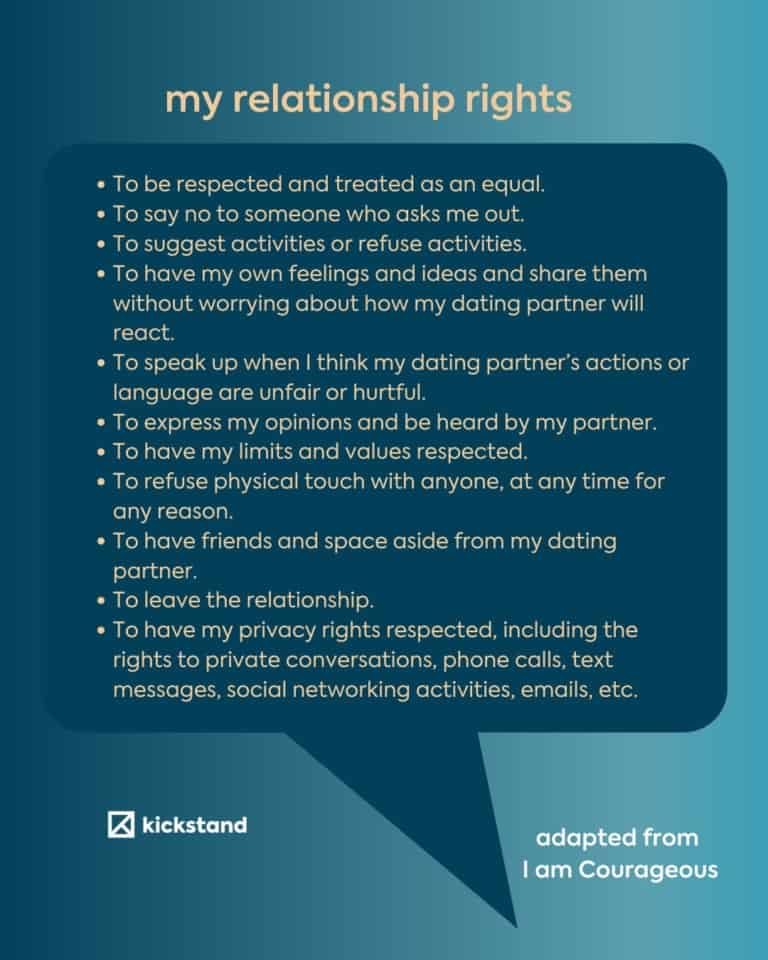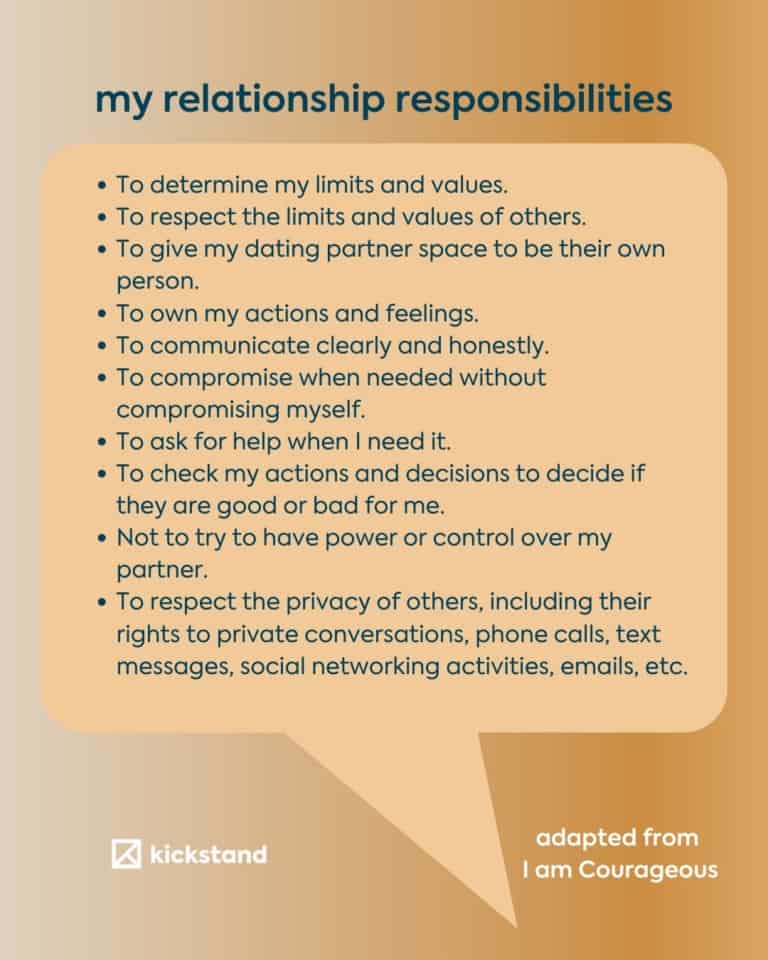Relationships with friends, family, and partners can be fulfilling and uplifting. Relationships can be healthy, and sometimes they can be unhealthy. Being part of an unhealthy relationship can be tough on mental, emotional, and physical health. However, healthy relationships have the potential to improve your overall health and wellbeing.
In a healthy relationship, everyone in the relationship should feel:
- Valued
- Heard
- Respected
- Safe
There are many ways you can maintain healthy relationships with your friends, your partner(s), or your family. These include:
- Being dependable
- Being flexible and willing to compromise
- Being realistic in your expectations about the relationship
- Remembering to also take care of yourself
- Communicating your feelings
- Setting boundaries
Some signs of an unhealthy relationship include:
- A lack of respect within the relationship
- Disrespect can look like constant teasing or not apologizing when someone’s feelings are hurt. It can look like pressuring someone into doing something they don’t want to do. Disrespect can also look like physical, emotional, and/or sexual abuse.
- A lack of equity
- This can include controlling behavior and/or an unwillingness to compromise. In general, there is a refusal to see the other as equal in the relationship.
- A lack of communication
- In an unhealthy relationship, disagreements might not be discussed openly and respectfully. One or both of the individuals might bully each other into agreement. The disagreements might also be met with silence.
Check out the video below from AMAZE Org on what makes a relationship healthy.
Communication
Communication is the key to any healthy relationship – from friendships, to romantic partnerships, to family and work relationships! Communication is not only about expressing your thoughts to others, but it is also about being a good listener. It is a two-way process. You might not always see eye to eye or agree with your friends, your partner, or your family members. However, it is important that you express your feelings in a respectful manner. And, you should also expect others to make you feel respected and safe enough to share your thoughts.
Below are some communication tips you can utilize in your relationships:
- Listen actively
- Practice listening to others not just to respond, but to truly make them feel heard. When having a conversation try being completely present in the moment. Active listening involves being patient with the other person as they speak, using both verbal and non-verbal feedback such as smiling, leaning in, telling them you are listening and for some people, eye contact.
- It is helpful to note that many neurodivergent people find eye contact over-stimulating, so just because someone is not making direct eye contact does not mean they are not listening! Everyone communicates differently and this is ok, as long as we each try to learn about the other person’s preferences.
- Quick tip: active listening is exactly that, active! This means it can be tiring. If you are having troubles paying attention and the conversation is important, maybe ask the other person if you can discuss it at another time.
- Use “I” statements
- Instead of saying “you did ___ and that made me upset”, try saying “I felt upset when you____ ”. You can also practice saying “I got annoyed when you ____ instead of “I get so annoyed with you”. This shifts the focus from blame and accusations, which can often lead to more arguments and strife, and refocuses the attention on behavior instead of the person.
- Be clear and direct
- Try not to beat about the bush, and don’t push aside your feelings. However, you should strive to be honest about your feelings, needs, and thoughts in a respectful, gentle and firm manner.
- Ask questions
- If you don’t understand something the other person is saying, don’t be embarrassed. We’ve all been there. Ask that person questions to help clarify what they are saying and avoid misunderstandings.
- Try to stay calm
- Arguments and disagreements are bound to happen. When they do, try not to get defensive because that can make things worse. Instead, tell the person you need a break. Walk away from the conversation if you have to, take a breath, and come back to it when everyone has cooled off.
- Be willing to apologize
- Saying sorry is not a mark of weakness, but of strength! Mistakes are completely normal. Having the courage to say you are sorry when you notice that you have made a mistake goes a long way in strengthening a relationship.
Consider pulling from the Dialectical Behavioral Therapy (DBT) framework, which can teach specific skills that help you maintain healthy relationships, and has different acronyms to easily remember those skills.
One of the acronyms is GIVE. It stands for:
- Gentle
- Practice being gentle in your approach and be mindful of other people’s emotions.
- Interested
- When communicating with others, practice showing interest in what they are saying. Body language such as eye contact and facial expressions can also convey interest, as well as verbal statements like “I am paying attention” or “I am interested in what you are saying.”
- Validate
- When speaking with a friend, a partner, a family member, a colleague, or a stranger, try echoing emotion back during the conversation. Emotional validation is trying to learn, understand and accept how another person might be feeling (whether you agree with it or not!) and expressing this back to them.
- Easy Manner
- By presenting yourself as being relaxed and comfortable, you are more likely to seem more approachable.
Remember to be yourself. You don’t have to fake emotions, or pretend you are interested if you are not! Smiling and respectfully bowing out of a conversation you are no longer interested in is also valid.
Boundaries
Personal boundaries are rules and guidelines a person sets up for themselves that help teach other people how they want other people to behave toward them. You can think of boundaries as imaginary fences we build around ourselves. Some might be high and impenetrable and some might be sturdy and have a gate. Others might be falling down and absent in places.
Personal boundaries can be hard to set up because we sometimes fear that creating boundaries might make us seem selfish. This is untrue as healthy boundaries are important to our well-being, safety, and peace of mind. Personal boundaries will change over time, be different with different people and for different areas of your life (e.g. sexual, emotional, spiritual, financial boundaries).
You have the right:
- To say no
- Your time and energy are valuable. Although you might be tempted to give a reason for saying no, it’s important to recognize that “no” is a complete sentence! You do not need to explain yourself. You have the right to simply say “no thank you” to a request.
- To be respected
- Nobody has the right to treat you badly or curse you, no mother, no father, no parent, no sibling or friend.
- To your space
- Go ahead and own your space! Take up space, you deserve it. You also deserve to have your emotional, physical, and spiritual space free of other people’s clutter.
You can set up boundaries for your:
- Physical space
- Emotional space
- Spiritual space
- Stuff
- Time and energy
- Personal finances
Check out the infographics below for more information on your relationship rights and responsibilities.


Boundary Setting Tips
- Be assertive
- Practice being assertive without being aggressive or rude. One way you can be assertive is by using “I” statements (link to use I statements).
- Practice saying “no thanks”
- Start small – practice saying no to small requests with friends. Be direct, be polite, and don’t lie. If someone pushes back, you do not need to apologize or explain yourself beyond “I do not want to”, “it’s not a good fit for me right now”, or “I do not have the time”.
- Safeguard your spaces
- Consider setting up boundaries for your tech spaces by temporarily deleting messaging apps when you don’t want to be contacted, or by putting your devices on do not disturb mode.
Tips for Saying No
- Be direct
- Make sure you clearly state your no, instead of beating around the bush to be polite. This will prevent any potential misunderstandings.
- Don’t lie
- Sometimes you might just not want to do something. If you don’t have a reason for saying no, simply saying “no, thank you” is enough.
- Be polite
- You don’t have to give a reason for saying no, but you can simply state “No, thank you, it sounds lovely, but maybe next time”. You can also add a “thanks for asking” statement after refusing to do something. It is also helpful to note that if someone is making you feel very uncomfortable, you do not need to be polite in this situation.
It’s important to recognize that your worth is not based on how much you do for other people. Learning to say no is very important, not only for your peace of mind, but it can also prevent you from feeling resentful later!
Check out this helpful page for further tips on how to set up some boundaries! Check out our Groups and Workshops for more real life, relationship building help! We also have private, free virtual appointments available with our Mental Health Therapists, Peer Support Worker, and Employment Support Worker.
Sources:
Relationship Communication Skills For Teenagers (plannedparenthood.org)
The No BS Guide to Setting Healthy Boundaries in Real Life (healthline.com)
How to Stop Saying Yes When You Want to Say No (tinybuddha.com)
AMAZE – Age appropriate info on puberty for tweens and their parents
Relationship Rights & Responsibilities | I Am Courageous
10 Tips for healthy realtionships | Healthy relationships | Amherst College



